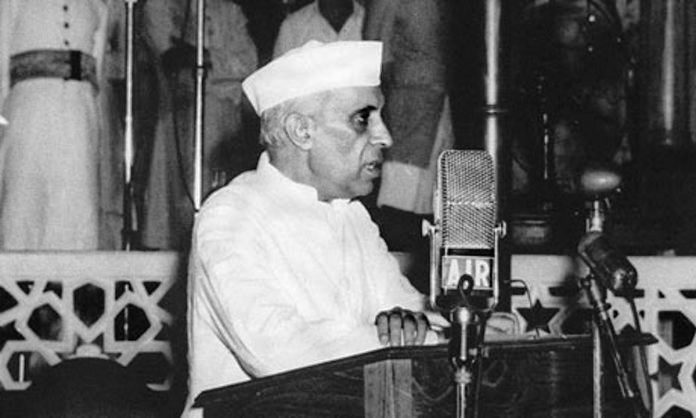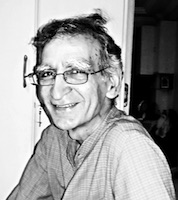In the last few years, there has been a concerted attempt by the NDA-ruled Central government to ignore and undermine the legacy of Jawaharlal Nehru. The iconic first PM’s name is maligned on all possible fronts – internationally, domestically and even on social media. It would be ignorance to presume that only fringe and radical elements are responsible for this, especially since present prime minister, Narendra Modi, has on many occasions derided the icon and cast a shadow on Nehruvian socialism. Following suit are BJP leaders, who have also resorted to derogatory Twitter tirades.

The erasure of Nehru isn’t limited to debates and speeches, it has also found its way into the annals of the freedom struggle. Nehru’s name does not find a mention in the National Archives’ exhibition on the Quit India Movement. Many school textbooks do not feature Nehru and his role in ridding India of its colonial oppression. Government spokespersons are even trying to attribute the failures of the present government to Nehru’s policies. They are blaming him for the Partition and the Kashmir issue.
If you look closely at the Centre’s efforts of discreetly wiping away Nehru’s legacy, one can see the hand of the Rashtriya Swayamsevak Sangh (RSS) – the Hindu organization’s aversion to Nehru and his socialist policies are common knowledge. And with Prime Minister Modi reciting the age-old RSS trope regarding the ‘Nehru versus Sardar Patel’ debate on Kashmir, one doesn’t have to wonder who is pulling the strings.
His role in the Freedom Struggle
Well-versed in global affairs and issues plaguing societies around the world, Nehru was a vocal proponent of equality and stood firm against racism. The Cambridge-educated Nehru was highly influenced by Gandhi’s freedom revolution, and on his return to India, he became an active part of the movement. On being appointed the Congress President, he raised the call for independence and was jailed by the British for 3,259 days. Nehru was a prolific writer and a voracious reader. His books An Autobiography, The Discovery of India and Letters from a Father to His Daughter are a prominent part of Indian literature.
Realities of Partition, Kashmir and his relations with Sardar Patel
When the British prepared to leave the country, V.D. Savarkar’s Two-Nation Theory and Mohammad Ali Jinnah’s adamant demand for Pakistan helped stoke demands for the Partition. In the matter of Kashmir, Patel in a speech in Junagadh pointed out that he was willing to let Kashmir go if Hyderabad merged with India. Whereas, it was at Sheikh Abdullah’s insistence that Nehru signed off on the “treaty of accession” and sent the Indian Army to check Pakistan’s aggression in the region.

As for the prime ministership, Gandhi had the mandate of the nation and considered Nehru to be a worthy successor. Even Patel had the utmost admiration for Nehru. In a letter published in Abhinandan Granth in 14 October 1949, Patel said, “It was, therefore, in the fitness of things that in the twilight preceding the dawn of independence he [Nehru] should have been our leading light, and that when India was faced with crisis after crisis, following the achievement of our freedom, he should have been the upholder of our faith and the leader of our legions.”
Credit for India’s economic and social uprising
Nehru’s contributions laid the foundations of modern India, with the leader heralding major changes in sectors such as industries, technology, agriculture, education and science. Nehru’s early public policies are proof that he was well aware of the need of State assistance for heavy industries. These views were also echoed by industrialists, who sought protection and aid in setting up units, in accordance with the Bombay Plan (1944).

A firm believer in the role of education, his policies shaped the Indian workforce and its march towards becoming an economic superpower. Even in the field of science, Nehru interventions proved crucial, as world-class institutes like the Indian Institutes of Technology (IITs), Indian Space Research Organisation (ISRO), Bhabha Atomic Research Centre (BARC), Council of Scientific Indian Research (CSIR), etc, were established. Healthcare, which was in a pitiable state, got a shot in the arm with the emergence of All India Institute of Medical Sciences (AIIMS). Given where we are today, it’s hard to imagine that we began with a literacy rate of 14 per cent and a mortality rate of 39 years.
An advocate of pluralism, Nehru was key in instilling secularist ideals in every strata of the Indian society and administration.
The Centre’s favourite whipping boy
Was he faultless? No way. He had his own quota of failures, such as his trusting China and the setback in the Sino-India War. But for all his shortcomings, Nehru as a leader left a deep and positive mark on India’s triumph.
But in its pettiness, the present government wants to ignore, undermine and belittle his contributions. Two of his major initiatives, the Planning Commission and the National Integration Council (NIC), have been done away with. Nehru has also become a target of the proponents of a sectarian ideology, who are systematically spreading falsehoods about his character, lineage and contributions. They see Nehru as a big ideological obstacle to furthering their own political agenda.
Forward Press also publishes books on Bahujan issues. Forward Press Books sheds light on the widespread problems as well as the finer aspects of Bahujan (Dalit, OBC, Adivasi, Nomadic, Pasmanda) society, culture, literature and politics. Contact us for a list of FP Books’ titles and to order. Mobile: +919968527911, Email: info@forwardmagazine.in)
The titles from Forward Press Books are also available on Kindle and these e-books cost less than their print versions. Browse and buy:
The Case for Bahujan Literature
Dalit Panthers: An Authoritative History





